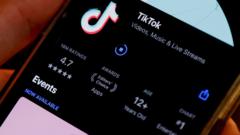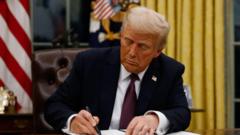TikTok's popularity is at risk ahead of a potential ban as creators and the Chinese government respond to Trump's statements.
Trump Considers 90-Day Ban Extension for TikTok Amid Controversy

Trump Considers 90-Day Ban Extension for TikTok Amid Controversy
Donald Trump hints at extending TikTok's ban deadline as creators voice concerns over the platform's future.
In a notable turn of events, Donald Trump has indicated that he may grant TikTok a 90-day reprieve from a ban set to take effect this Sunday, coinciding with Trump's inauguration as the 47th President of the United States. Speaking with NBC News, Trump confirmed that he would likely announce this extension following his swearing-in ceremony, highlighting the complexity of the situation surrounding the widely-used app.
The potential extension comes after TikTok warned that it would "go dark" effective Sunday should the outgoing Biden administration not take any action to halt the impending ban. This ban follows a Supreme Court ruling reaffirming a law that could ban the app unless its Chinese parent company, ByteDance, sells the platform by January 19—a condition to which ByteDance has so far refused to comply.
"The 90-day extension is something that will be most likely done because it's appropriate," Trump stated during his NBC phone interview, underscoring the importance of a careful evaluation of the situation. "We have to look at it carefully. It's a very big situation."
Expressing similar sentiments in an interview with ABC News, Trump reaffirmed his authority to make such decisions, emphasizing that he would consider extending the timeline to allow for further deliberation. TikTok has pointed out its frustrations, claiming a lack of clarity and assurance from the White House and Department of Justice regarding its operational status.
Reacting to TikTok's announcement of possibly going dark, White House Press Secretary Karine Jean-Pierre dismissed it as merely a publicity stunt, insisting that any future actions would rest solely with the incoming administration. "We have laid out our position clearly: actions to implement this law will fall to the next administration," she expressed confidently.
In discussions with Chinese President Xi Jinping, Trump mentioned TikTok among other topics, reflecting on the platform's international significance. Meanwhile, TikTok's CEO, Shou Zi Chew, is anticipated to be present at Trump's inauguration, highlighting the stakes involved for both American and Chinese interests.
National security officials in the U.S. have raised alarms that TikTok's data could be exploited by Chinese spies, a concern the app has consistently denied. As the debate surrounding the app intensifies, creators are left uncertain about their future on a platform they rely on for income and engagement with followers.
As TikTok continues to thrive among its 170 million U.S. users, the app has become integral to American political strategies aimed at younger demographics. Should a ban like that imposed in India back in 2020 occur, the implications for creators and brands could be devastating. For many, TikTok is a significant part of their revenue generation, as articulated by fashion designer Nicole Bloomgarden.
With the deadline fast approaching, TikTok's fate remains uncertain as the spotlight falls on sensitive negotiations and the growing influence of digital media in America.
The potential extension comes after TikTok warned that it would "go dark" effective Sunday should the outgoing Biden administration not take any action to halt the impending ban. This ban follows a Supreme Court ruling reaffirming a law that could ban the app unless its Chinese parent company, ByteDance, sells the platform by January 19—a condition to which ByteDance has so far refused to comply.
"The 90-day extension is something that will be most likely done because it's appropriate," Trump stated during his NBC phone interview, underscoring the importance of a careful evaluation of the situation. "We have to look at it carefully. It's a very big situation."
Expressing similar sentiments in an interview with ABC News, Trump reaffirmed his authority to make such decisions, emphasizing that he would consider extending the timeline to allow for further deliberation. TikTok has pointed out its frustrations, claiming a lack of clarity and assurance from the White House and Department of Justice regarding its operational status.
Reacting to TikTok's announcement of possibly going dark, White House Press Secretary Karine Jean-Pierre dismissed it as merely a publicity stunt, insisting that any future actions would rest solely with the incoming administration. "We have laid out our position clearly: actions to implement this law will fall to the next administration," she expressed confidently.
In discussions with Chinese President Xi Jinping, Trump mentioned TikTok among other topics, reflecting on the platform's international significance. Meanwhile, TikTok's CEO, Shou Zi Chew, is anticipated to be present at Trump's inauguration, highlighting the stakes involved for both American and Chinese interests.
National security officials in the U.S. have raised alarms that TikTok's data could be exploited by Chinese spies, a concern the app has consistently denied. As the debate surrounding the app intensifies, creators are left uncertain about their future on a platform they rely on for income and engagement with followers.
As TikTok continues to thrive among its 170 million U.S. users, the app has become integral to American political strategies aimed at younger demographics. Should a ban like that imposed in India back in 2020 occur, the implications for creators and brands could be devastating. For many, TikTok is a significant part of their revenue generation, as articulated by fashion designer Nicole Bloomgarden.
With the deadline fast approaching, TikTok's fate remains uncertain as the spotlight falls on sensitive negotiations and the growing influence of digital media in America.























